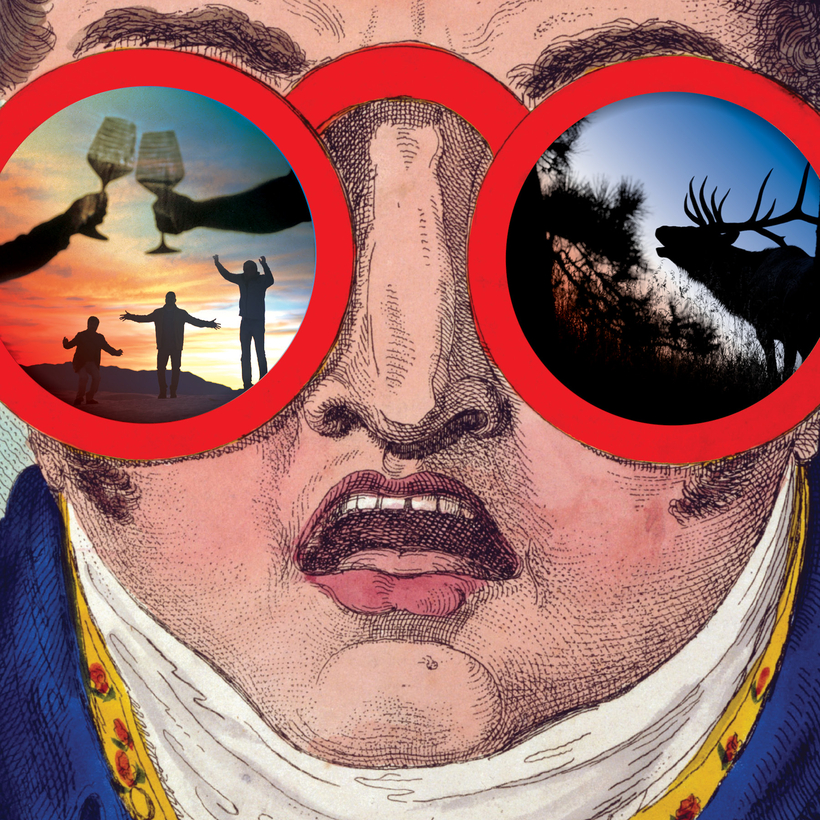There was a time when, if a man asked me to his studio to look at his buffalo, I’d assume that I’d be viewing something that did not involve hooves. That time is not now. Now I’m old, and Maurice Burns is older, and I am staring at an actual buffalo. It is black and purple and yellow, life-size, and magnificent.
Not that Burns, who lives in Santa Fe, came to Ucross to paint anything of the sort. But once he got to Ucross, an artist residency set on a 20,000-acre ranch in the High Plains of Wyoming … well, buffalo happen. Burns is fretting, though. Yesterday Ucross’s visiting board of directors paid him a surprise visit to check out his work. He wasn’t finished. “If you’re in the middle of making love, and somebody comes and interrupts you and pulls you away, you can’t go right back to where you left off,” he says. “And that’s what painting is like. You’re making love, and when some other folk appear, it’s hard for me to get going again.”
No matter. The board was very happy with Burns, and eventually Burns was happy with his buffalo. And that’s why we’re all here. For just a little bit of happy with the work we do—happy that, in the real world, is not always easy to come by.
Ucross is one of the top-three residencies in the country—the others being MacDowell, in New Hampshire, and Yaddo, in Saratoga Springs, New York—and its alumni have produced more than their share of Pulitzer Prize, Guggenheim, and MacArthur awardees. Billy Porter was recently a guest, as was Annie Proulx; Colson Whitehead and Ann Patchett are frequent fliers; Elizabeth Gilbert beavered away here on Eat Pray Love. But a residency cannot live on stars alone. It needs up-and-comers, people you’ve never heard of—but may. Working artists who, like working actors, aren’t exactly rolling in it—“it” being money and fame. You apply for a residency—a couple of weeks, a month, maybe more, of subsidized solitude—and, fleetingly, the doubts fade. You are chosen. You belong.
One night, rambling through a field of velvet blackness dotted with hundreds of seemingly radioactive eyes (I’d been assured that none of them belonged to artist-eating bears), Louisiana State University professor and artist Kelli Scott Kelley explained the lure of artist residencies succinctly: “Being here makes you feel like, yes, you are worth the time and the space.”
I recently spent 10 days at a Ucross artist residency—not for any merit of my own, God knows, but more as an embedded civilian to see what the place was like. I had the best real estate of anyone, a music composer’s studio isolated from the main property, where the deer and the antelope played, literally, outside my window. The composer Jeanine Tesori, known for her work on the musical Fun Home, had recently signed the guest book. (I would plink on the piano and stare at the occasional snake sunning outside my window (no bare feet outside, I’d been warned) and think of what James Baldwin said about working at a residency: “The place in which I most wanted to be when the time comes, as it perpetually does, to crouch in order to spring.”
Ucross is one of a handful of select paid residencies, meaning you are paid to be there. I deeply enjoyed the envy of friends. “OMG YOU’RE AT UCROSS!” texted the writer Laura Zigman. “I’ve wanted to go there since like 1997 after Animal Husbandry came out… No one had ever heard of it then. Now it’s the shizz. I almost applied this year but didn’t have the energy to get people to write recommendations for me. I’m 59 years old, I’m not applying to college.”
There are artist residencies around the world, from Germany to Senegal, and more than 100 in the U.S. alone. Plenty are pay-to-play, pretty much the Trump Universities of residencies, whereas a handful, like Ucross, Yaddo, and MacDowell, are the Ivies. Each has its own flavor.
Ucross’s residency manager, Ryan Landis, calls Ucross “art camp” (and I added in my own head “social-justice camp,” since virtually every person there was working on a project that involved displaced or marginalized people. I kept wondering if John Cheever would have made the cut).
MacDowell is known gleefully as “sex camp”—or, perhaps more accurately, “divorce camp.” Former residents tell story after story of what happens when you put a bunch of needy, insecure strangers into a contained living space without their children or spouses. Your time is your own. You can either work, drink, or fornicate, and guess which of those things is more popular than the others?
Yaddo, being located near the racetrack near Saratoga Springs, has the benefit of bonus vices, but when I was visiting there years ago, all I needed to hear from a resident composer was “Want to see my room? I’m staying in the one where Philip Roth wrote ‘The Breast.’” And for me, Yaddo became MacDowell.
MacDowell is known gleefully as “sex camp”—or, perhaps more accurately, “divorce camp.”
Not surprisingly, there are some artists who become a little addicted. The average residency lasts anywhere from two weeks to two months, but residents talk in hushed tones about one woman who managed to string together stays in artist residencies for four consecutive years. No one knew if she had an actual home.
At any rate, here are the Four Truths You Will Learn at a Residency:
I. Everybody asks for your opinion. And by “opinion,” they mean praise: All of those impromptu readings, studio visits, workshops at night where constructive criticism is solicited? For the love of God, keep your mouth shut. And not just any praise will do. It must be fulsome and on message. One evening, an artist held a studio visit; she made intricate woven pieces of saturated color that are somehow extracted from the inter-relationship of weather patterns and coronavirus data. She had finished this slightly mystifying explanation when a fellow artist next to me muttered, “These would make really great place mats.”
II. Dining becomes a religious experience: partly because it’s the one time of the day you talk to other humans, and partly because, at least at Ucross, the food is possibly the best I’ve ever had. Chef Cindy Brooks would present the menu (sample one evening: grilled lamb chops; roasted sprouts; linguini with cremini mushrooms and truffle oil; something with hazelnuts; focaccia topped with fresh mozzarella, basil, and plump tomatoes from the garden; Caesar salad; and flan with raspberries), and we would burst into spontaneous applause. The quality of the food is not an accident. Notes Stephen Jimenez, the journalist, television producer, and currently vice president of Ucross, “We’re about the food. Good food makes people feel deeply nurtured. This is not a coincidence.” (The foundation just came out with The Ucross Cookbook, which even this clueless cooking tyro has used successfully.)
III. You will cherish 9 of your fellow residents, and the 10th you will want to murder in her sleep. This is the person who enjoys intoning about the Creative Process and tends to write sentences like “Thoughts and feelings began cascading.” They frequent residencies even if they have to pay for them, and they are like those freeloading British houseguests who gush over every tiny detail because they are afraid of not being invited back. Our particular resident, a psychotherapist turned poet, was peeved that I hadn’t interviewed her sufficiently and decided I might not be treating the artists with the reverence they deserved.
She e-mailed a note to me that began, “I don’t know what your angle will be but I did want to say that I hope you won’t include the conversation from the other night, all the snarky stuff about other residencies, rich as that material might be. It’s actually kind of hackneyed stuff anyway.... It’s really all about the people, respect for each other and our work, times of communal connection as well as deep self-absorption. Really totally unique experiences in this world. Yes, sometimes super partying takes place, sometimes romance, sometimes cliquishness, sometimes sheer perfection—but those are elusive categorizations in my opinion.” I’m not entirely sure what the last bit means, but I do know that as I was leaving she sent a fellow resident to convey that she was disappointed in me.
My thoughts and feelings cascaded.
IV. You can joke all you want, but, particularly for a city dweller, a stay at a residency can be life changing. Today the playwright Philip Himburg is the executive director of MacDowell (although he is stepping down in December), but for many years he was theatrical director of the Sundance Institute, which held summer theater residencies at Ucross. He explained something that is a bit hard for us city dwellers to believe until you’ve experienced it for yourself: work changes when you are in a different landscape.
“This is not a hippie-dippie idea,” he explains. There is something about the confluence of art and nature that makes you confront your art in a way you wouldn’t have back in the city. A lot of people come back from Ucross and say, “I wouldn’t have written the same work if I’d been in Brooklyn.”
And it’s true. In one week, even with the usual distraction of the Internets, I got more done than I’d accomplished in months prior … and I wasn’t even there to work.
Leaving can be tough. “An artist isn’t going to make it in this country; you’re always going to be poor; you’re always going to be working at Starbucks,” says Natalie Miebach, a Boston artist. “But I come here and I feel rich. Because I’m doing what I love, and I’m surrounded by other people who are doing what they love. They’ve sacrificed to come here.” (Welllll. Not quite sure about the whole “sacrifice” thing, but I think I get the idea.)
A couple of nights before I left, there was an impromptu party in a trailer house on the property. Tricia Romano, who is working on an oral history of The Village Voice, is playing Ping-Pong with Darrel Alejandro Holnes, a poet who writes about being gay and Panamanian. Ricardo Nuila, a Texas physician who is writing a book about poverty and health care in America, is knocking back a long neck. And Jennifer Kidwell, a beautiful performance artist, is swaying softly to the music. It’s Drake’s “Hotline Bling” …
Everybody knows and I feel left out
Girl, you got me down, you got me stressed out
‘Cause ever since I left the city, you
Started wearing less and goin’ out more…
You used to call me on my cell phone
Late-night when you need my love
Call me on my cell phone
Late-night when you need my love
I know when that hotline bling
That can only mean one thing … It’s a song of love and longing, FOMO, insecurity, bravado … a cry for validation from a gifted soul who’s not sure he is enough. It should be, I think, the anthem for artist residencies everywhere.
To hear Judith Newman reveal more about her story, listen to her on AIR MAIL’s Morning Meeting podcast
Judith Newman is a New York–based writer and the author of To Siri with Love


